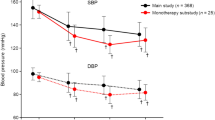Abstract
Renal denervation can reduce blood pressure in patients with uncontrolled hypertension. The adherence to prescribed antihypertensive medication following renal denervation is unknown. This study investigated adherence to prescribed antihypertensive treatment by liquid chromatography–high resolution tandem mass spectrometry in plasma and urine at baseline and 6 months after renal denervation in 100 patients with resistant hypertension, defined as baseline office systolic blood pressure ≥140 mmHg despite treatment with ≥3 antihypertensive agents. At baseline, complete adherence to all prescribed antihypertensive agents was observed in 52 patients, 46 patients were partially adherent, and two patients were completely non-adherent. Baseline office blood pressure was 167/88 ± 19/16 mmHg with a corresponding 24-h blood pressure of 154/86 ± 15/13 mmHg. Renal denervation significantly reduced office and ambulatory blood pressure at 6-month follow-up by 15/5 mmHg (p < 0.001/p < 0.001) and 8/4 mmHg (p < 0.001/p = 0.001), respectively. Mean adherence to prescribed treatment was significantly reduced from 85.0 % at baseline to 80.7 %, 6 months after renal denervation (p = 0.005). The blood pressure decrease was not explained by improvements in adherence following the procedure. Patients not responding to treatment significantly reduced their drug intake following the procedure. Adherence was highest for angiotensin-converting enzyme inhibitors/angiotensin receptor blockers and beta blockers (>90 %) and lowest for vasodilators (21 %). In conclusion, renal denervation can reduce office and ambulatory blood pressure in patients with resistant hypertension despite a significant reduction in adherence to antihypertensive treatment after 6 months.






Similar content being viewed by others
References
Mancia G, Fagard R, Narkiewicz K et al (2013) 2013 ESH/ESC Guidelines for the management of arterial hypertension: the Task Force for the management of arterial hypertension of the European Society of Hypertension (ESH) and of the European Society of Cardiology (ESC). Eur Heart J 34(28):2159–2219. doi:10.1093/eurheartj/eht151
Judd E, Calhoun DA (2014) Apparent and true resistant hypertension: definition, prevalence and outcomes. J Hum Hypertens 28(8):463–468. doi:10.1038/jhh.2013.140
Jung O, Gechter JL, Wunder C, Paulke A, Bartel C, Geiger H, Toennes SW (2013) Resistant hypertension? Assessment of adherence by toxicological urine analysis. J Hypertens 31(4):766–774. doi:10.1097/HJH.0b013e32835e2286
Tomaszewski M, White C, Patel P et al (2014) High rates of non-adherence to antihypertensive treatment revealed by high-performance liquid chromatography-tandem mass spectrometry (HP LC-MS/MS) urine analysis. Heart 100(11):855–861. doi:10.1136/heartjnl-2013-305063
Böhm M, Schumacher H, Laufs U, Sleight P, Schmieder R, Unger T, Teo K, Yusuf S (2013) Effects of nonpersistence with medication on outcomes in high-risk patients with cardiovascular disease. Am Heart J 166(2):306–314.e7. doi:10.1016/j.ahj.2013.04.016
Mahfoud F, Lüscher TF, Andersson B et al (2013) Expert consensus document from the European Society of Cardiology on catheter-based renal denervation. Eur Heart J 34(28):2149–2157. doi:10.1093/eurheartj/eht154
Esler MD, Krum H, Schlaich M, Schmieder RE, Böhm M, Sobotka PA (2012) Renal sympathetic denervation for treatment of drug-resistant hypertension: one-year results from the Symplicity HTN-2 randomized, controlled trial. Circulation 126(25):2976–2982. doi:10.1161/CIRCULATIONAHA.112.130880
Mahfoud F, Ukena C, Schmieder RE et al (2013) Ambulatory blood pressure changes after renal sympathetic denervation in patients with resistant hypertension. Circulation 128(2):132–140. doi:10.1161/CIRCULATIONAHA.112.000949
Worthley SG, Tsioufis CP, Worthley MI, Sinhal A, Chew DP, Meredith IT, Malaiapan Y, Papademetriou V (2013) Safety and efficacy of a multi-electrode renal sympathetic denervation system in resistant hypertension: the EnligHTN I trial. Eur Heart J 34(28):2132–2140. doi:10.1093/eurheartj/eht197
Azizi M, Sapoval M, Gosse P et al (2015) Optimum and stepped care standardised antihypertensive treatment with or without renal denervation for resistant hypertension (DENERHTN): a multicentre, open-label, randomised controlled trial. Lancet 385(9981):1957–1965. doi:10.1016/S0140-6736(14)61942-5
Böhm M, Mahfoud F, Ukena C et al (2015) First Report of the Global SYMPLICITY Registry on effect of renal artery denervation in patients with uncontrolled hypertension. Hypertension 65(4):766–774. doi:10.1161/Hypertensionaha.114.05010
Krum H, Schlaich MP, Sobotka PA, Böhm M, Mahfoud F, Rocha-Singh K, Katholi R, Esler MD (2014) Percutaneous renal denervation in patients with treatment-resistant hypertension: final 3-year report of the Symplicity HTN-1 study. Lancet 383(9917):622–629. doi:10.1016/s0140-6736(13)62192-3
Bhatt DL, Kandzari DE, O’Neill WW et al (2014) A controlled trial of renal denervation for resistant hypertension. N Engl J Med 370(15):1393–1401. doi:10.1056/NEJMoa1402670
Fadl Elmula FEM, Hoffmann P, Larstorp AC et al (2014) Adjusted drug treatment is superior to renal sympathetic denervation in patients with true treatment-resistant hypertension. Hypertension 63:991–999. doi:10.1161/HYPERTENSIONAHA.114.03246
Persu A, Jin Y, Fadl Elmula FE, Jacobs L, Renkin J, Kjeldsen S (2014) Renal denervation after Symplicity HTN-3: an update. Curr Hypertens Rep 16(8):460. doi:10.1007/s11906-014-0460-x
Waeber B, Feihl F (2013) Assessment of drug compliance in patients with high blood pressure resistant to antihypertensive therapy. EuroIntervention 9(Suppl R):R29–R34. doi:10.4244/eijv9sra6
Burnier M, Wuerzner G, Struijker-Boudier H, Urquhart J (2013) Measuring, analyzing, and managing drug adherence in resistant hypertension. Hypertension 62(2):218–225. doi:10.1161/hypertensionaha.113.00687
Ewen S, Baumgarten T, Rettig-Ewen V, Mahfoud F, Griese-Mammen N, Schulz M, Böhm M, Laufs U (2015) Analyses of drugs stored at home by elderly patients with chronic heart failure. Clin Res Cardiol 104(4):320–327. doi:10.1007/s00392-014-0783-2
Maurer HH (2007) Current role of liquid chromatography-mass spectrometry in clinical and forensic toxicology. Anal Bioanal Chem 388(7):1315–1325. doi:10.1007/s00216-007-1248-5
Tsioufis C, Mahfoud F, Mancia G, Redon J, Damascelli B, Zeller T, Schmieder RE (2014) What the interventionalist should know about renal denervation in hypertensive patients: a position paper by the ESH WG on the interventional treatment of hypertension. EuroIntervention 9(9):1027–1035. doi:10.4244/EIJV9I9A175
Wissenbach DK, Meyer MR, Remane D, Weber AA, Maurer HH (2011) Development of the first metabolite-based LC-MS(n) urine drug screening procedure-exemplified for antidepressants. Anal Bioanal Chem 400(1):79–88. doi:10.1007/s00216-010-4398-9
Helfer AG, Turcant A, Boels D, Ferec S, Lelievre B, Welter J, Meyer MR, Maurer HH (2015) Elucidation of the metabolites of the novel psychoactive substance 4-methyl-N-ethyl-cathinone (4-MEC) in human urine and pooled liver microsomes by GC-MS and LC–HR-MS/MS techniques and of its detectability by GC-MS or LC-MS(n) standard screening approaches. Drug Test Anal 7(5):368–375. doi:10.1002/dta.1682
Maurer HH (2010) Analytical toxicology. EXS 100:317–337
Parati G, Stergiou G, O’Brien E et al (2014) European society of hypertension practice guidelines for ambulatory blood pressure monitoring. J Hypertens 32(7):1359–1366. doi:10.1097/HJH.0000000000000221
Mahfoud F, Luscher TF (2015) Renal denervation: symply trapped by complexity? Eur Heart J 36(4):199–202. doi:10.1093/eurheartj/ehu450
Rosa J, Widimsky P, Tousek P et al (2015) Randomized comparison of renal denervation versus intensified pharmacotherapy including spironolactone in true-resistant hypertension: six-month results from the prague-15 study. Hypertension 65(2):407–413. doi:10.1161/hypertensionaha.114.04019
Lüscher TF, Mahfoud F (2014) Renal nerve ablation after SYMPLICITY HTN-3: confused at the higher level? Eur Heart J 35(26):1706–1711. doi:10.1093/eurheartj/ehu195
Mahfoud F, Edelman ER, Böhm M (2014) Catheter-based renal denervation is no simple matter: lessons to be learned from our anatomy? J Am Coll Cardiol 64(7):644–646. doi:10.1016/j.jacc.2014.05.037
Burnier M, Schneider MP, Chiolero A, Stubi CL, Brunner HR (2001) Electronic compliance monitoring in resistant hypertension: the basis for rational therapeutic decisions. J Hypertens 19(2):335–341
Kronish IM, Woodward M, Sergie Z, Ogedegbe G, Falzon L, Mann DM (2011) Meta-analysis: impact of drug class on adherence to antihypertensives. Circulation 123(15):1611–1621. doi:10.1161/CIRCULATIONAHA.110.983874
Baranda AB, Alonso RM, Jimenez RM, Weinmann W (2006) Instability of calcium channel antagonists during sample preparation for LC-MS-MS analysis of serum samples. Forensic Sci Int 156(1):23–34. doi:10.1016/j.forsciint.2004.11.014
Acknowledgments
The study was supported by the Deutsche Forschungsgemeinschaft (KFO 196), Deutsche Gesellschaft für Kardiologie, and Deutsche Hochdruckliga.
Author information
Authors and Affiliations
Corresponding authors
Ethics declarations
Conflict of interest
The institution (Klinik für Innere Medizin III, Universitätsklinikum des Saarlandes) has received scientific support from Medtronic/Ardian. CU, MB and FM received speaker honorarium from Medtronic/Ardian (Mountain View, California, US), and St. Jude Medical (Eschborn, Germany). BC has received speaker honorarium from Medtronic/Ardian (Mountain View, California, US). CU and MB are supported by Deutsche Forschungsgemeinschaft (KFO 196). SE, DL and FM are supported by Deutsche Hochdruckliga. FM is supported by Deutsche Gesellschaft für Kardiologie.
Electronic supplementary material
Below is the link to the electronic supplementary material.
Rights and permissions
About this article
Cite this article
Ewen, S., Meyer, M.R., Cremers, B. et al. Blood pressure reductions following catheter-based renal denervation are not related to improvements in adherence to antihypertensive drugs measured by urine/plasma toxicological analysis. Clin Res Cardiol 104, 1097–1105 (2015). https://doi.org/10.1007/s00392-015-0905-5
Received:
Accepted:
Published:
Issue Date:
DOI: https://doi.org/10.1007/s00392-015-0905-5




